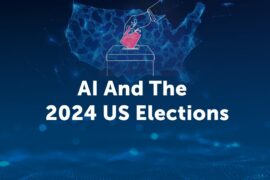
The 2024 U.S. elections was marked by the largest use of AI-driven technologies in political campaigns, voter engagement, and election security. With advances in generative AI (GenAI), campaigns had more tools than ever to reach and engage voters.
As these technologies reshape political communication, they bring risks—particularly around misinformation. Can AI empower a more informed electorate without compromising trust?
The Impact of AI on Campaigns
AI impacted the election campaigns by automating the analysis of voter datasets, including demographics, voting history, and social media behavior. This enabled candidates to tailor messages for voter segments, driving engagement among undecided or disengaged voters.
AI also helped campaigns prioritize topics that resonate with different groups, making for more efficient outreach. For instance, candidates focused on job creation in certain regions or environmental issues for younger demographics.
AI enhanced campaign efficiency by enabling real-time analysis of voter sentiment, allowing candidates to adapt their strategies swiftly. It also facilitated better engagement with specific voter segments through personalized content, ensuring key issues were addressed more effectively. AI-powered tools improved campaign logistics, streamlining operations such as ad placement and event scheduling to maximize impact.
At the same time, AI introduced risks of misuse, particularly with disinformation, AI-generated personas, and deepfakes. While tech companies developed tools to counteract these efforts, their adaptability remains a challenge.
Balancing Opportunities and Challenges
While AI presented risks, it also offered tools to help counter those challenges in the 2024 elections. Major tech companies from Meta to Microsoft deployed AI for content verification to flag and label AI-generated content, detect potential deepfakes, and scrutinize manipulated media.
The Election Assistance Commission (EAC) supported AI-powered election oversight tools to ensure accurate voter rolls, prevent duplicate registrations, and address potential fraud in real-time.
As these tools evolve, regulatory backing will be essential. Congress’s recent Election Administrators for AI Act aims to establish clear guidelines for election authorities to leverage AI, fostering public confidence and transparency.
Bottom Line
As AI’s role in elections grows, so does the responsibility to ensure that it serves democracy. When used thoughtfully, AI has the potential to make elections more accessible and engaging by delivering timely, relevant information to voters.
However, the same technology could erode trust, with deepfakes and misinformation confusing voters and undermining election integrity. As voters, officials, and candidates alike adapt to an AI-powered landscape, vigilance and collaboration will be critical.
Click here to learn more about the transformative impact of AI in the modern business landscape with an AI expert.


